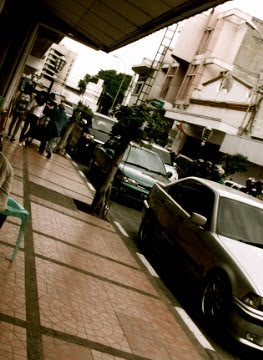I love public transport.
Here or moreover abroad.
I am people person, and even though I know I could take my own car, joined with others who have their own personal car and make traffic jam in the street altogether- there were times that I kept telling myself I should stay to my idealism and take public transport.
For me, taking a public transport means a more environmental-friendly approach than personal vehicle (of course). And being in a public transport with people, it's like sharing not just a car but also a life, their stories. Sometimes, it could be very VERY annoying when you're stuck with thoughtless people, who smokes regardless the car was already suffocated enough with 10 persons.
But also there were times it could be a rewarding moment, seeing interaction of people who help each other. Being a witness of such behaviour, I know it was not such a bad idea to stay on public transport.
I admit, though, public transport system in Indonesia is not the safest place in the earth.
In fact, it's one of the dangerous experience that you could have in your whole life.
Just recently, a minivan crashed at the place close to my hometown and few people died.
When I was a young doctor in a hospital, I saw too many cars/motorbikes accidents, some of them due to irrational behavior of the drivers.
It is a crazy and tough life on the streets here.
Back again during my study (or traveling) year in Europe (or elsewhere in Asia), I analyzed what make these developed countries build a success public transport system.
Is it a good system who drive users to oblige or start from capable users who drive the good public transport system?
I've come to the conclusion of: both.
It has to be driven simultaneously by systems (also environmental) and users.
For example, any Indonesian people who have been to Singapore, they know that they have to adhere to such strict regulation (not just transport, but also not to spit in public etc. Gosh).
Or any Germans (mostly they follow the rules) who have been to Indonesia they would find their way out from tricky traffic jams by doing exactly (or almost the same) like any Indonesian.
It's just their adaptation behavior to the systems, either it's good or bad.
Even in Europe, there's a huge difference between public systems in Denmark and in Italy.
My analysis: It's just because Danes have less emotional feelings on the street and stick to the regulation easily than Italians (and oh, I'm on the Italiano side :-)
Biking rules in Netherlands is very laid-back compare to Denmark.
So this is also applied to their personalities, I'd say.
What about in Indonesia?
Here, taking a public transport it's like the option of poor people.
For those who can't afford their own personal motorbikes or cars.
It's very unreliable, chaotic, unsafe, dangerous (remember few weeks or months ago, about raping in public transport. It scares me and a lot of women too, I bet) and it's like risk taking every day when you don't have other choice.
And people, like me, who knows this experience, made a vow to themselves- as soon as I get more money I would buy my own bike/car so I won't stuck in this crazy situation everyday!
But that's not a long term solution!
People are getting rich these days.
There will be more people who could afford their own personal vehicles.
There will be more motorbikes and cars in the street (it's already happened actually)
surely, there'll be more traffic jams here and there. We know it already!
At some point, every places in Indonesia, will be like Jakarta.
People are physically and mentally test every day in the streets due to its chaotic conditions.
The solution: We need more public transport, which is secure, reliable and cost-effective (we're not saying cheap, I'm sure a lot of people would rather to pay reasonable price as long it's worth).
We should shout it out loud to our government!
Or basically those who care, if the government burns out with too many task.
It could be public-private-shared organisation, I won't go into detail and it's not my expertise either. But we surely need this, now or later.

No comments:
Post a Comment